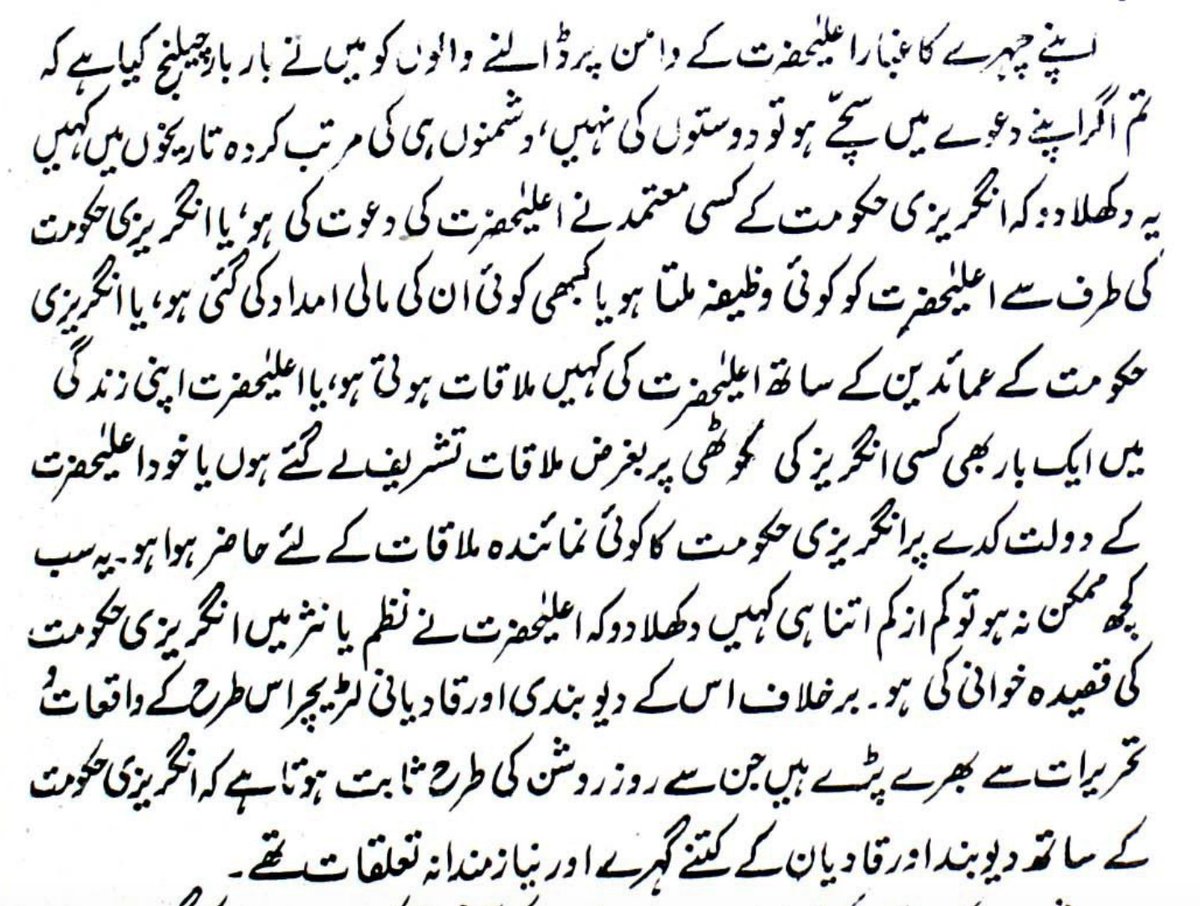
IS IT VALID TO BELIEVE ALLĀH IS LOCATED ON THE ÁRSH?
Alahazrat Imām Aĥmad Riđā Khān al-Ĥanafī al-Baraylawī [1272-1340 AH / 1856-1921 CE] was sent by Ţālib Álī Sahib on 15th Jamād al-Ūlā 1336 AH:
To consider the Dhāt of Bārī [the Creator] táālā to be only on the Ársh and not to
Alahazrat Imām Aĥmad Riđā Khān al-Ĥanafī al-Baraylawī [1272-1340 AH / 1856-1921 CE] was sent by Ţālib Álī Sahib on 15th Jamād al-Ūlā 1336 AH:
To consider the Dhāt of Bārī [the Creator] táālā to be only on the Ársh and not to

consider any creation of Allāh, other than above the Ársh, to be encompassing the Dhāt of Bārī táālā, but rather to say that only the Divine knowledge encompasses all things and his Dhāt is solely on the Ársh, and not in another place. Is this belief that of Ahl e Sunnat or
not? And the one who believes this, is it permissible or not to pray behind him? And also explain this, that people attribute this belief to the Ĥanābilah, is this truly the belief of the Ĥanābilah or not? To consider the Dhāt of Allāh to be on the Ársh, without expressing the
modality of Istiwā’a and to consider His knowledge to encompass the entire world, and is it the view of Ahl e Sunnat to interpret the verse of [His] accompanying and proximity etc to be proximity and accompanying of knowledge? And is the prayer sound, without dislike, behind one
who believes this view? It is [mentioned] in Sharĥ Ĥikmat e Nabawiyyah, “We believe that He is on the Ársh with Istiwā’a upon it; Istiwā’a that transcends being placed and being settled, and that He is above the Ársh whilst also He is close to every existent thing, and He is
closer than the jugular vein, and His closeness is not similar to that of bodies”. And it is [mentioned] in Siyar al-Nubalā, Is’hāq ibn Rāhawayh said, “The scholars have Ijmāá that He táālā did Istiwā’a on the Ársh, and that He knows everything beneath the seventh earth.”
And in Jāmiý al-Tirmidhī, after mention of the Ĥadīth, “If you were to drop a rope to the lowest earth, then it would reach Allāh, then RasūlAllāh ﷺ recited, He only is the First and He only the Last, and He only is the Evident and He only the Concealed; and it is He Who knows
all things”, it is written, “The recitation of the verse proves that by ‘it would reach Allāh’, he intended, it reached the knowledge of Allāh, His power, and His authority, and the knowledge of Allāh is in all places whilst He is on the Ársh, as He described Himself in His
Book. And this, that is famous, that this is the view of the Ĥanābilah is incorrect, rather this is the view of the majority of the verifiers of the Ĥanafiyyah, Shāfiýīyyah, Mālikiyyah, and Ĥanābilah, and the Muĥaddithīn and others. Rather, some Ĥanabilah began to say Istiwā’a
with description of the modality, and considered the settlement of Allāh to be similar to the settlement of creation, this view is rejected, and the details require much capacity, whereas what we have mentioned is sufficient, and Allāh táālā knows best what is correct.
Written by Muĥammad Karāmat Álī, may he be pardoned.
The answer:
God forbid! This is, on no account, the belief of Ahl e Sunnat. He transcends place and being placed, the Ársh is not His place, nor is any other place. The Ársh and the earth are ĥādith [occurrences],
The answer:
God forbid! This is, on no account, the belief of Ahl e Sunnat. He transcends place and being placed, the Ársh is not His place, nor is any other place. The Ársh and the earth are ĥādith [occurrences],

and He is qadīm [pre-eternal], azalī [eternal], abadī [unending], sarmadī [interminable], until all these did not exist, where was He? He is, as He always was, and as He is now, He shall be for all eternity. The Ársh and the earth are all changing, they are ĥādith, they are fānī
[transient], and He and His Attributes transcend taghayyur [change], ĥudūth [being an occurrence] and fanā [annihilation]. What is the need to narrate Ijmāá upon Istiwā’a? Raĥmān ázza wa jall Himself states, “Raĥmān made Istiwā’a on the Ársh”, however the belief of Ahl e Sunnat
is that which their Rabb ázza wa jall taught those having sound knowledge, “and those having sound knowledge say, ‘We believe in it, all of it is from our Lord’; and none accept guidance except the men of understanding.” The belief of Ahl e Sunnat is that which Umm al-Mu’minīn
Umm Salamah رضی اللہ تعالی عنہا stated, “Istiwā’a is established; its quiddity is not known; to believe in it is obligatory; and to investigate its meaning is bidáh.” Ahl e Sunnat has two methodologies in abstruse [mutashābihāt] verses. The methodology of the Salaf e Şāliĥ is
Tafwīđ; we do not know their meanings, nor do we discuss them, whatever is understood by their apparent, that is certainly not their intent, and that which their Rabb ázza wa jall intended, we believe that, “We believe in it, all of it is from our Lord”. The second methodology
is that of the latter scholars, that in order to protect the dīn of the laity, steering away from the impossible meaning to take to a sound meaning that is close, such as Istiwā’a with meaning of Istīylā’a [subduing], “Bishr subdued Iraq,
without the sword or spilling of blood”. However, this false methodology that the verses of accompanying are carried upon interpretation but the verse of Istiwā’a is taken upon the apparent, is not, on any account, the methodology of Ahl e Sunnat. “He is on the Ársh, not in
another place”, this is clearly indicating being placed; you affirmed a place for Him on the Ársh, máādhAllāh, whilst you negated other places. It is explained in Áālamghīriyyah, Ţarīqah e Muĥammadiyyah, Ĥadīqah e Nadiyyah, Tātārkhāniyyah, Khulāşah, Jāmiýu’l Fuşūlayn,
Khizānatu’l Muftīyīn etc, that to affirm a place for Rabb ázza wa jall, in any manner, in any place, is Kufr. Among the latter Ĥanābilah some impure ones became anthropomorphists [mujassimah], such as Ibn e Taymiyyah and Ibn e Qayyim. Ibn e Taymiyyah states that I have searched
all places, and did not find and [so] it is non-existent, there is no difference between these two. That is, that which is not in a place is not existent but Rabb ázza wa jall is, máādhAllāh, certainly in a place. If this foolish dimwit does not know the difference between
the material and immaterial, then there are sufficient places that are ĥādith to cut his neck with the cutting sword that we have mentioned above. When there was not even any place, where was He? He will probably say this, that when there was no place, He was not there either, or
he will say this, that place is also qadīm and azalī, and both [statements] are Kufr. When, according to him, his deity cannot exist without being present in a place, then he is dependent upon a place, and the one who is dependent is not Allāh. Then, in reality, it is necessary
for them to reject Allāh. To pray behind one who holds such a belief is forbidden and impermissible. And Allāh táālā knows best.
[Fatāwā al-Riđawiyyah]
• • •
Missing some Tweet in this thread? You can try to
force a refresh






















